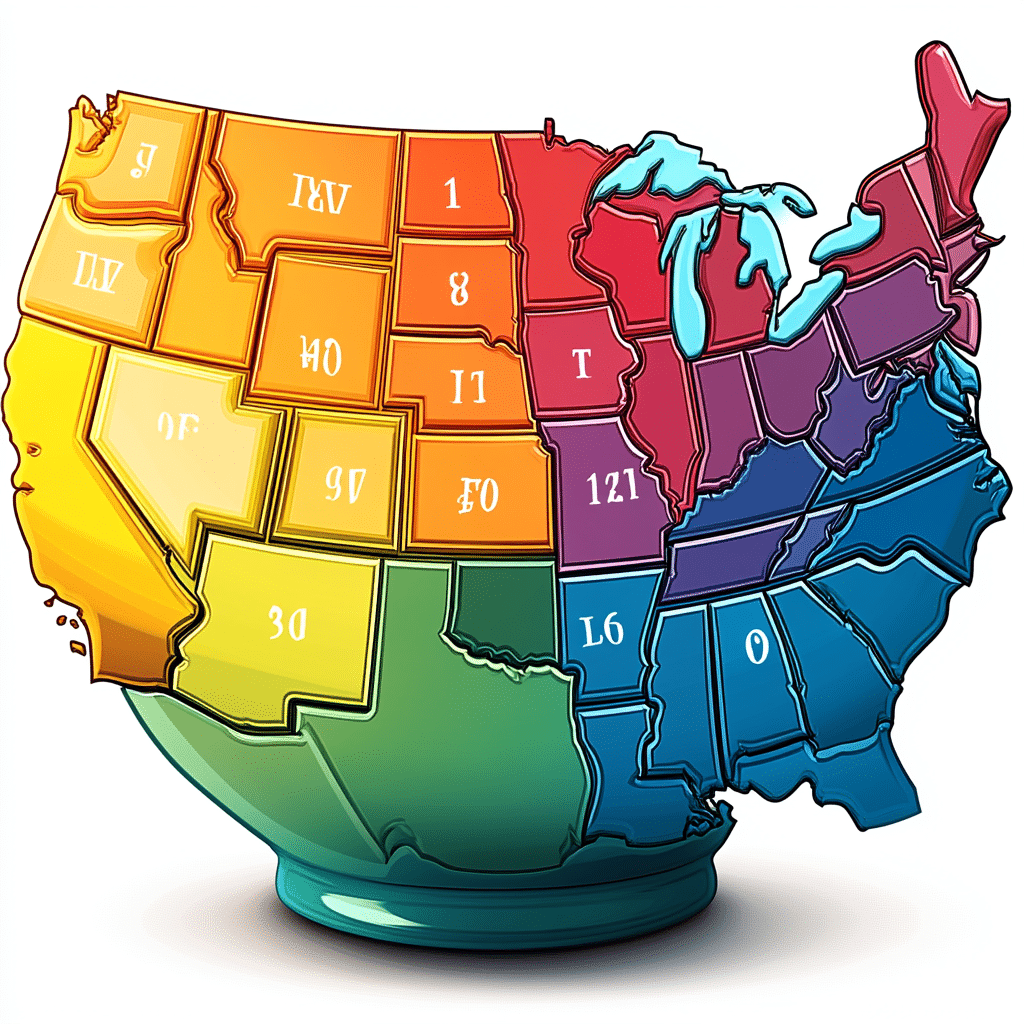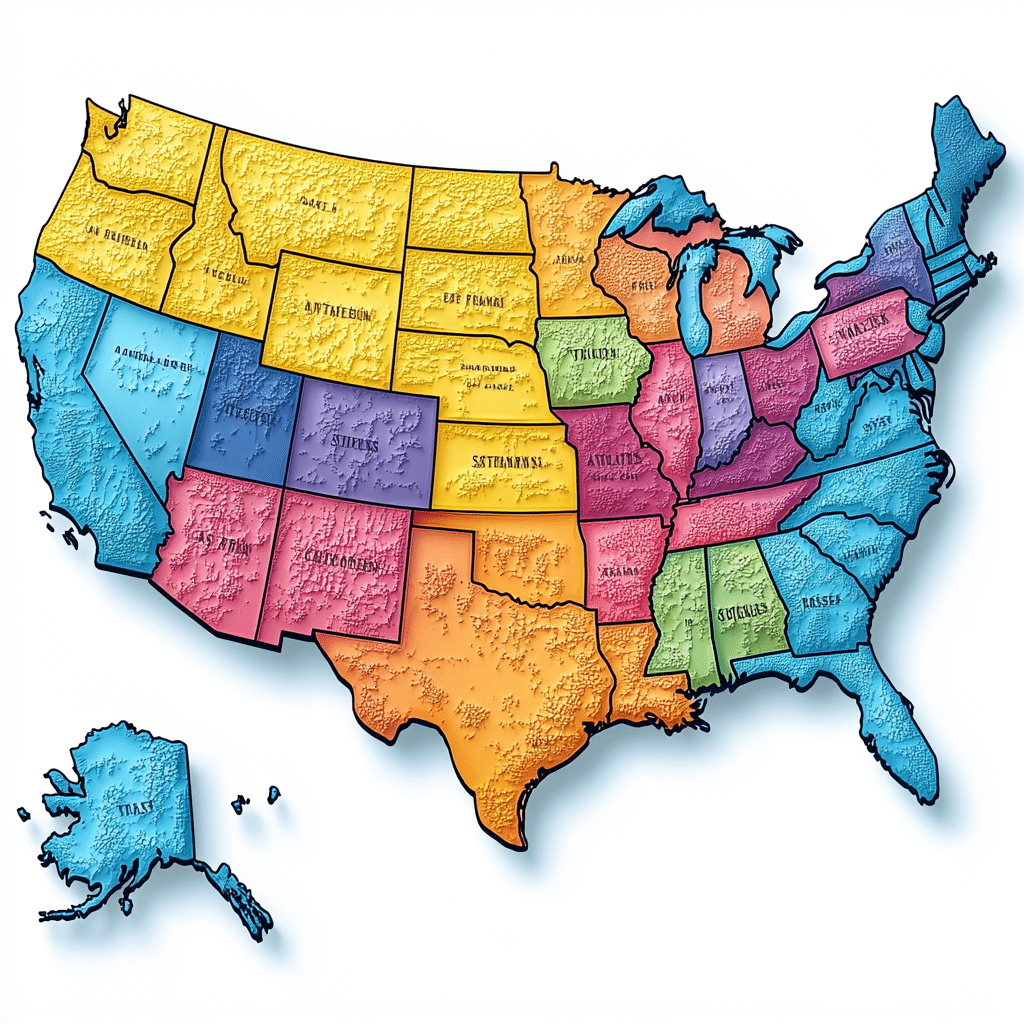Navigating the labyrinth of tax policies across the United States can be daunting. From Alabama to Wyoming, taxes vary widely, impacting your overall financial well-being. This ultimate guide aims to simplify your journey by pinpointing the states with the lowest taxes, paving the way to greater savings and investment opportunities.

States With Low Income Tax: Exploring the Most Affordable Locations
As the debate over tax rates continues across the United States, certain states come into focus for offering uniquely low-income taxes. Residents of these states benefit from keeping more of their paychecks, which can lead to increased saving and spending power. Let’s examine these states and uncover what makes them tax-friendly havens.
1. Wyoming
Wyoming is synonymous with rugged natural beauty and a tax structure that’s just as appealing. As one of the few states with no income tax, Wyoming offsets its revenue through mineral extraction And tourism. Thanks to Grand Teton and Yellowstone National Parks attracting millions of visitors annually, the state’s economy thrives without burdening residents with high taxes.
2. Florida
Florida not only offers year-round sunshine but also no state income tax. This makes it a haven for retirees and working professionals alike. The Sunshine State relies heavily on its tourism sector, pulling in revenue from destinations like Walt Disney world and Miami Beach. Additionally, Florida offers competitive property taxes, which further enhances its appeal.
3. Texas
Like Wyoming and Florida, Texas imposes no state income tax. Its economic engine is powered by various industries, including energy, technology, and agriculture. Cities like Austin and Dallas are tech hubs, while Houston ‘s economy is bolstered by the oil industry. The lack of income tax makes Texas an attractive option for both individuals and businesses looking to minimize their tax burdens.
4. Nevada
Nevada, home to Las Vegas, ensures that residents and businesses pay no state income tax. The state’s economy banks heavily on the entertainment and gaming industry, drawing millions of tourists annually to its casinos and resorts. This influx of out-of-state money helps maintain a financially stable environment for residents who enjoy low taxation.
5. South Dakota
South Dakota stands out as another state without a personal income tax. The state capitalizes on its agricultural economy and significant tourism, with Mount Rushmore and the Black Hills drawing sizeable numbers of visitors. The business climate is also favorable, attracting a plethora of companies interested in the low-tax environment.

States With the Lowest Taxes: A Comprehensive Ranking
Having explored states with minimal or no income tax, let’s shift our focus to a holistic evaluation of states with the overall lowest taxes. This includes property and sales taxes, giving a fuller picture of states where residents can optimize their finances.
1. Alaska
Alaska is a unique case, offering not only no state income tax but also no state sales tax. Funded largely by its oil revenues, Alaska’s Permanent Fund Dividend even pays residents an annual stipend. This combination of absent taxes and financial bonuses makes Alaska an extremely tax-friendly environment.
2. Tennessee
Tennessee’s only state-level tax on personal income applies solely to dividends and interest, which is being phased out by 2025. Coupled with moderate property taxes and no wage taxes, Tennessee makes financial sense for diverse demographic segments, including burgeoning tech companies in Nashville and Memphis.
3. New Hampshire
New Hampshire is notable for having neither a state income tax nor a state sales tax. Revenue is sourced from business profits taxes and real estate transfer taxes. Additionally, property taxes are relatively high but are balanced by the state’s other tax advantages.
4. Delaware
While Delaware does impose a state income tax, it features no sales tax, which is a significant savings point for residents and consumers. Corporate America also favors Delaware for its business-friendly tax policies, leading to a robust economic landscape that supports lower individual tax burdens.
5. Montana
Montana’s low property taxes and absence of sales tax make it an attractive place for residents seeking financial efficiency. While it does have a state income tax, the cost-savings on property and daily goods help to offset this and make living here financially advantageous.
| State | Income Tax Rate | Property Tax Rate | Sales Tax Rate | Additional Benefits |
| Wyoming | 0% | 0.59% | 4% | No estate tax; low overall tax burden |
| Alaska | 0% | 1.02% | 0% | No state sales tax; Permanent Fund Dividend |
| South Dakota | 0% | 1.22% | 4.5% | No corporate income tax |
| Florida | 0% | 0.83% | 6% | No state income tax |
| Texas | 0% | 1.83% | 6.25% | No state income tax |
| Nevada | 0% | 0.60% | 6.85% | No state corporate or individual income tax |
| Tennessee | 0% on wages | 0.68% | 7% | No state income tax on wages |
| Washington | 0% | 0.93% | 6.5% | High threshold for estate tax |
| New Hampshire | 0% on wages | 2.20% | 0% | Low sales tax limitations |
| Montana | 0% | 0.85% | 0% | No state sales tax |
The Impact of Tax Policies on Your Financial Health
Understanding how state tax policies impact your financial health can be crucial for making informed decisions about where to live, work, or start a business. States with low-income taxes or overall lower tax burdens afford residents greater financial flexibility. This can manifest in higher disposable income, better savings, and increased investing power.
For retirees, low-tax states can preserve limited retirement funds. For working professionals, it means more money in savings or investments. For businesses, these environments can lower operational costs, increasing profitability and encouraging growth. Each group finds unique advantages in these tax policies, contributing to a diverse, thriving community.
Maximizing Benefits in Low Tax States
To maximize the benefits of living in a low-tax state:
By carefully analyzing these factors, you can make strategic decisions that align with your financial goals, ultimately benefiting greatly from the low-tax environments these states offer.
Tax-Friendly States: Final Considerations
When choosing where to live, the tax burden can be a pivotal factor. States with low-income taxes and those with the lowest overall taxes provide various financial benefits and lifestyle advantages. From the energy-rich state of Texas to the tourist-driven economy of Nevada, each state offers unique benefits that can cater to different needs and preferences. The financial breathing room provided by these low-tax states can lead to a more prosperous and enjoyable life, allowing residents to focus on their passions rather than their tax bills.
Armed with this comprehensive guide, you’re better positioned to make an informed decision about which low-tax state may best suit your lifestyle and financial goals in 2024 and beyond.
States With The Lowest Taxes: Fun Trivia and Interesting Facts
Tax Rates: Surprising States You Didn’t Expect
Who would’ve thought that some of the states with the lowest taxes are not what you’d assume? Often, folks guess states like California or New York might have low taxes, but those actually have hefty tax rates. For instance, states like Wyoming and South Dakota surprise many with their low tax rates. If you think about it, it’s quite the twist from the hustle and bustle of high-tax states. And speaking of twists, ever checked out the Chris Farley death picture? It’s a stark reminder to cherish life’s surprises, both good and bad.
No Income Tax? Count Me In!
Imagine a place where you don’t have to pay state income tax. Sounds a bit dreamy, right? Well, Florida and Texas offer exactly that. It’s an enticing perk for retirees and young professionals alike. It’s akin to hearing about the Manchester time, an unexpected gem in a sea of cities. Living in a state with no income tax can feel like you’ve found that gem. Fiscal freedom often leads to a higher quality of life and more disposable income.
What’s the Catch?
Now, you might be wondering, How much are Taxes really in these states? Well, besides no state income tax, many states also keep their sales taxes relatively low. For example, Wyoming not only offers no state income tax but boasts one of the lowest sales tax rates in the country. It seems almost too good to be true, akin to discovering the tax rates by state and realizing how differently states structure their taxation. It’s good to do your homework and see how it all adds up.
California? Think Again
And while we’re at it, let’s bust a myth. Many people believe California offers good tax rates, but the reality is quite the opposite. In fact, the California state tax rate is among the highest in the nation. It’s more like a reality check, much like asking someone,How much are taxes? and then realizing they’re far more than you imagined. Steering clear of such high-tax states might be a savvy move for those looking to maximize their earnings.
By embedding these fun trivia and interesting facts within the broader picture of states with the lowest taxes, we hope you find this guide both informative and engaging. Time to pack your bags and move to a low-tax haven, maybe?




